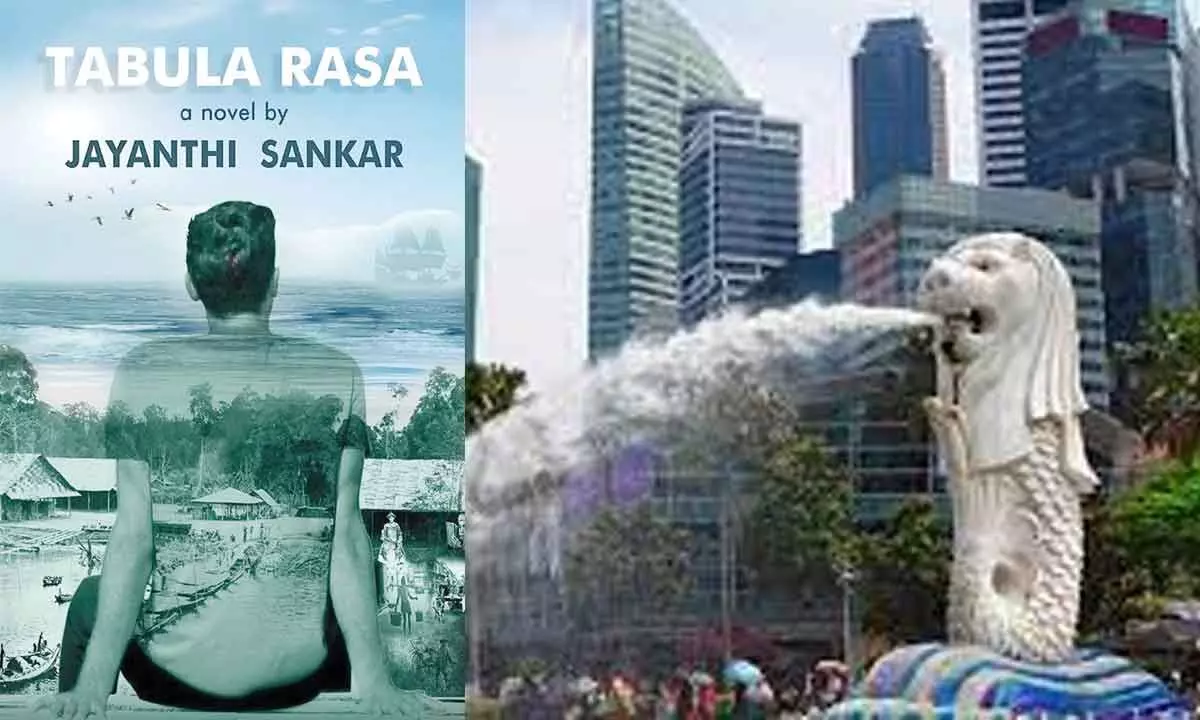Live
- From defence to culture and sports, India and Kuwait sign key agreements during PM Modi's visit
- Mahakumbh 2025: 110 mist blower machines and 107 fogging units to keep Akharas insect-free
- Piyush Goyal participates in Mahila Shakti Shivir event, calls Bima Sakhi Yojana 'a revolutionary initiative'
- Death toll from Cyclone Chido in Mozambique rises to 94
- 13 criminals from two gangs arrested in Jharkhand's Ramgarh for extortion
- Union Minister Bandi Sanjay Visits Injured Boy Sritej at KIMS Hospital
- Construction of over 1,000 bridges underway in Assam: CM Sarma
- Telangana IAS Officers wives association meets president Droupadi Murmu
- Nara Devaansh Sets World Record with Checkmate Marathon
- India set to become developed nation by 2047: Haryana CM
Just In

When it comes to the idea of storytelling, Jayanthi Sankar can be pertinently placed on a high pedestal.
When it comes to the idea of storytelling, Jayanthi Sankar can be pertinently placed on a high pedestal. Taking recourse to her fecund imagination the woman author based at Singapore has once again cast a spell on the lovers of fiction with her outpouring Tabula Rasa in which she keenly explores innovative ways of unfolding a narrative which is leavened with historical details. The book sheds a flood of light on the history and origin of the breath-taking island of Singapore.
What gravitates the readers about the book is the manner in which deeply engaging accounts of several facets of life in this island nation have been portrayed. Since the author has been living there for decades, it enables her to present her first-hand account of its dockyards, the shipbuilding industries, the day to day life of contractors, the vagaries of the immigrant labourers, their psychological upheavals and the attitudes and aspirations of the people residing there.
Much to our gratification, the book demolishes some old ossified myth and misconceptions prevalent all across the globe about Singapore. Demystifying certain notions, the author assiduously endeavours to take off the blinkers of prejudices. As we flip through the pages of the book to get deeply immersed into its fathomless profundity, a new reality dawns upon us about the circumstances which play a pivotal role in the christening of the island. As the novel belongs to the genre of historical fiction, its details also talk of the old rulers and the immigrant population from the various parts of the world.
Uprooted from their native lands and settled or somewhat unsettled, these migrants render their unstinting services to strengthen the social fabric of their new home. Living with remarkable concord, these newly evolved communities present a fresh perspective on life by ushering in a new vigour and vitality to their newly found nation.
As far as the plot of the narrative is concerned, it seems the author is deeply influenced by the great Greek master Aristotle. Complying with the canons of a well-knit plot, the novelist commendably stitches all the threads together in a unified whole. The unities of place, time and action described by Aristotle in his magnum opus book Poetics have been solemnly adhered to. While contemplating over her art of carving out characters, it can be delightfully asserted that the author appears to possess a special knack for creating life like characters, pulsating with the elements of probability and relatability propounded by Aristotle. Unlike the flawless angels descending down from a fairy land, her characters have their own foils and foibles. In order to lend them the semblance of living human beings, the novelist meticulously infuses them with their idiosyncrasies, quirks and peculiarities. Though the characters are the finest representatives of the social community they hail from, they are never made to lose their individuality.
The book widens our horizons about the life and culture of Singapore. In an absolutely elegant fashion, we are made familiar with two main British colonial formative forefathers and the political systems they ameliorate. Therefore, it will not be erroneous to remark that the novel depicts the journey of the evolution of Singapore and how the prevailing systems in the nation have their affinity to the past.
The characters subtly and sublimely enshrined in the novel retain all the genuine human attributes. The readers instantly forge a kind of unique bond with Li Wei Muthu, Li Xiu Ying, Ali and Adnan, Lily and Rose, Rani and Shanti, Meena, Suresh and Kavitha. All have to grapple with their own challenges. The engrossing conversations between Li Wei and his mother lay bare the subterranean layers of their subconscious minds and reveal their psychological makeover. Here, the author deserves a plethora of praise for her finest linguistic sensibilities and her command of English language. The syntactic constructions have been rendered with utmost finesse. The usage of morphological item is also in synchronisation with the subject matter. To conclude, this is a must read for all.

© 2024 Hyderabad Media House Limited/The Hans India. All rights reserved. Powered by hocalwire.com







